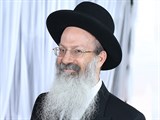- Sections
- Revivim
- Shabbat and Holidays
- The Meaning Sefirat Ha'omer
246
Another angle: On the holiday of Pesach, the simple, natural faith that is hidden in the soul of every Jew, and remained hidden in the Jewish people’s collective soul even when they were enslaved in Egypt, comes to the fore. On Shavuot, however, we rise to a more developed faith, one that is clarified and expanded by virtue of the Torah. Natural faith is very powerful, and it is the foundation of life, but it is not capable of guiding and perfecting life. By way of the Torah and its commandments, we are able to link all aspects of our lives – those related to thought, emotions, and actions – to faith.
As a result, by counting the Omer, we gradually elevate ourselves in two ways, ascending from a level of nationalism to that of spirituality, and from natural faith to a sophisticated faith based on Torah and mitzvoth.
It is impossible to reach Shavu’ot without Pesach. Once we recognize Israel’s segulah (unique nature), we can rise up and attain the Torah. Once we realize that Israel is the chosen nation, as the Exodus from Egypt demonstrated, we can receive the Torah, as we say in the blessing over the Torah, "Blessed are You, O Lord… Who has chosen us from all the nations," and subsequently "has given us His Torah." Similarly, it is impossible to absorb the complex, developed faith that is assimilated in the intellect without first discovering the simple, natural faith. Therefore, it is very important to connect the holiday of Pesach to that of Shavu’ot. The counting of the Omer is the link and the ladder that connects these two holidays.
This idea is alluded to in the fact that we are commanded to count "from the day you bring the Omer of waving" (VaYikra 23:15). The Omer is a unique offering made from barley, which is animal food. This represents the physical-national side of Israel. Before we receive the Torah and attain knowledge of the Divine, we are like animals, which have no intellect. When we finish counting fifty days and are privileged to receive the Torah and reach a lofty spiritual state, then, You shall offer a new meal-offering to the Lord (ibid. 23:16). Similarly, matzah is bread of affliction; the Zohar teaches that it is bread of faith, namely, natural faith. The new meal-offering brought on Shavu’ot is made of leavened wheat; it is rich and developed, alluding to the complete revelation of faith in every aspect of this world. On Pesach, the revelation of natural faith occurs through constraint – the restriction against leavened bread. On Shavu’ot, however, it occurs through expansion (see Rav Kook’s Orot Yisrael 8:1).
Perhaps it is possible to say that this is the basis of the dispute whether counting the Omer today is a Biblical or Rabbinic mitzvah. If the purpose of the count is to raise ourselves from simple faith to intellectual faith, by way of Torah study, then even today, it is Biblically ordained. But if the purpose is to elevate us from a revelation of faith by way of limitation and abstinence which expresses itself in the prohibition of leavened bread, to a level of faith that reveals itself in all areas of life, in the physical world, with all its pleasures, then the matter depends on the existence of the Holy Temple, which connects heaven and earth. Therefore, as long as we are unable to offer the Omer, which represents the material forces and which enables us to rise to the level required to offer the Two Loaves on Shavu’ot, we cannot completely reveal faith in all areas of life. Therefore, the counting is only Rabbinically mandated.

Revivim (56)
Rabbi Eliezer Melamed
31 - The Mitzvah of Settling the Land of Israel
32 - Counting the Omer: Ascending from Nationalism to Spirituality
33 - Holiness through Nature
Load More
Rosh Hashana - Expressing the Acceptance of G-d's Kingdom
Rabbi Eliezer Melamed | Elul 26 5775
Should Israel go for a decisive or partial victory?
Rabbi Eliezer Melamed | Cheshvan 9 5776
At What Age Should One Marry in Our Times
Rabbi Eliezer Melamed | 5775
When Av Arrives, We Curtail Our Joy - but How?
Rabbi Eliezer Melamed | Av 1 5775

Adar - the month of laughter
Rabbi Haggai Lundin | Shvat 5773

Shir Hyichud on Yom Kippur
Rabbi Yoel Lieberman | 5573




